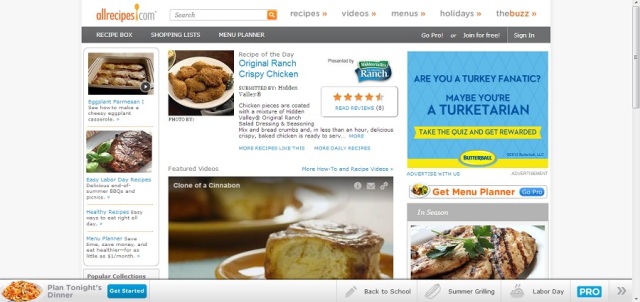Paper cookbooks vs electronic; dead trees vs the interwebs. There is a big argument going right now over whether paper or electronic cookbooks (or all books for that matter) are better. I am sure that a similar argument was had over the lifeless uniformity of gutenberg’s type versus the beauty and character of handwritten illuminated manuscripts. We see how that panned out. Katie and I are quite fond of paper books, and we have a library to prove it. All of that said, we have one foot in the past and one in the future; we are after all a blog about cookbooks.
Electronic recipes have many benefits. In just a few clicks you can punch in the contents of your fridge and have a recipe for a stew, stir-fry, daube, or fricassee, using just the ingredients you have on hand. Or you can build a weekly menu, and have the shopping list beamed to your handheld computer-phone. Sites like allrecipes make it easy to compare several versions of recipes, quickly see which ones are more popular, then see reviews from hundreds or or even thousands of people who have tried it. You can even see variations and notes from people that have tried and found one thing or another to work better i.e. glass vs. metal pan.
 Paper cookbooks have character. They are fun in a way that googling a recipe is not. We like to keep our eyes peeled for older James Beard Award Winners, out of print versions and other treasures at used bookstores, flea markets and thrift stores. There is a tremendous amount of knowledge out there from people who are much better at getting their point across than I am. I find that the internet democratizes information in a way that is both empowering and infuriating. You could make a career out of correcting people that are wrong on the internet, but if you tried you’d probably go insane. The traditional book publishing process helps weed out some of the junk, but even that isn’t perfect. Even so, the work that goes into producing a printed book means that several people have checked and re-checked the work. Overall the quality tends to be higher, simply because people tend to put more effort into the process. The real beauty of traditional cookbooks is that they connect us with our food traditions over the last 200 years or so that they have been regularly published and allow us to reach back and carry those things forward.
Paper cookbooks have character. They are fun in a way that googling a recipe is not. We like to keep our eyes peeled for older James Beard Award Winners, out of print versions and other treasures at used bookstores, flea markets and thrift stores. There is a tremendous amount of knowledge out there from people who are much better at getting their point across than I am. I find that the internet democratizes information in a way that is both empowering and infuriating. You could make a career out of correcting people that are wrong on the internet, but if you tried you’d probably go insane. The traditional book publishing process helps weed out some of the junk, but even that isn’t perfect. Even so, the work that goes into producing a printed book means that several people have checked and re-checked the work. Overall the quality tends to be higher, simply because people tend to put more effort into the process. The real beauty of traditional cookbooks is that they connect us with our food traditions over the last 200 years or so that they have been regularly published and allow us to reach back and carry those things forward.
Eventually, and more rapidly than we suppose (within a generation I would guess), electronic media will replace paper for most of our daily uses. The benefits are real, but for those of us who grew up with them, books maintain a very powerful connection, and I don’t think they are going away so soon, or so easily. I think that there are lessons to be learned from the different types of cookbooks, and that these lessons will continue to be valid whether the media is electronic or the printed page.
